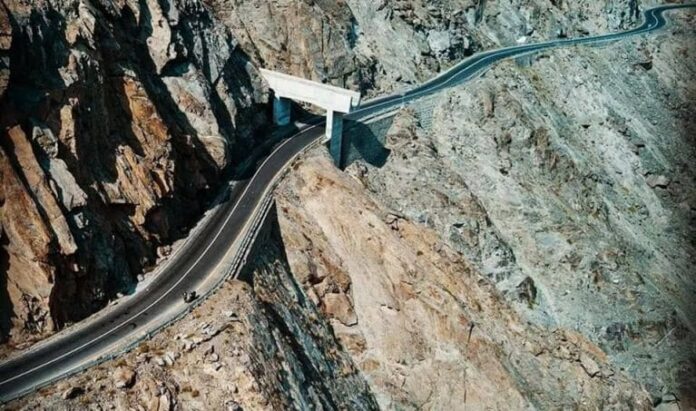Several traders were detained on Monday after staging a protest near the Pakistan-China border, demanding the rollback of income and sales taxes collected at the Sost Dry Port. The action followed a call by the Pak-China Trades Action Committee, a representative body of traders in Gilgit-Baltistan, which also announced the closure of the dry port. As reported by Dawn.
In response, demonstrators blocked the Karakoram Highway at multiple points across Hunza and Nagar districts, leaving a significant number of tourists and travelers stranded in both regions.
Hunza Deputy Commissioner (DC) Huzaifa Anwar confirmed to Dawn.com that traders had staged sit-ins at two locations in Hunza. “The Murtazaabad protest has concluded, but the sit-in in Sost, near the Pak-China border, is still ongoing,” he said, adding that negotiations with protesters were underway and authorities hoped to resolve the standoff within a few hours.
The DC clarified that three traders were taken into custody at the Sost Dry Port after the protest announcement. One of them has been released, while the other two remain in what he described as “protective custody.” He emphasized that no formal arrests were made and no cases registered.
“The immediate focus is to reopen the Karakoram Highway, especially since many tourists are stuck and facing difficulties,” DC Anwar added.
According to announcements from local traders, the Silk Route Dry Port was to be closed and sit-ins held along the highway on Monday. However, they claim that a police operation took place overnight, during which homes of several prominent traders — including Ali Nazar, Abbas Mir, and Farman Tajik — were raided and the individuals arrested.
Protesters have now set up tents along the highway in Nagar’s Rakaposhi area and in Murtazaabad, Hunza, resulting in hundreds of Pakistani and foreign travelers being stranded.
Addressing the protest in Nagar, former president of the Gilgit-Baltistan Chamber of Commerce, Javed Hussain, blamed the local administration for turning a peaceful demonstration into a confrontation by detaining traders. He issued a strong warning: “If the administration has the power to detain our traders, then keep them locked up. Otherwise, we’ll break them out ourselves.” He added that he would not compromise on the rights of GB and was willing to leave the PML-N party “a thousand times” if needed.
Protesters also shouted slogans against the deputy commissioner and district police chief, holding them responsible for the crackdown.
Another former Chamber president, Imran Ali, reiterated that the protest was sparked by renewed attempts to collect income and sales tax at the Sost Dry Port. “An earlier agreement on this issue was violated, leading to today’s port closure and highway sit-in,” he said.
DC Anwar maintained that the situation was under control and that negotiations were progressing. Meanwhile, Nagar DC Asghar Khan attributed some of the road closures to a Muharram procession, clarifying that no traders had been arrested in Nagar and that the highway had not been blocked there.
This week’s unrest follows similar demonstrations in June, when traders — supported by political parties — protested what they described as exploitative policies imposed by the Federal Board of Revenue (FBR). Earlier in May, traders also staged an indefinite sit-in at Pissan in Nagar district, blocking the Karakoram Highway and stranding thousands of local and international travelers on both sides of the Khunjerab Pass.




